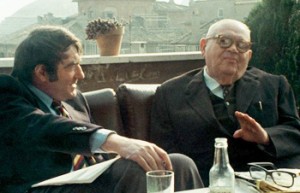Arts
Personality
Q&A with Director Claude Lanzmann

Benjamin Murmelstein in 1975.
In this sitdown, Judith Gelman Myers questions Claude Lanzmann’s deeply personal defense of the man he interviews, Benjamin Murmelstein, in his new film, The Last of the Unjust. In 1975, Lanzmann found Murmelstein, the last ghetto council leader, or Judenälteste, of the Theresienstadt ghetto, living in self-imposed exile in Rome. Members of these Councils of Jewish Elders often served out of the belief that they could ameliorate conditions for their community, but they were regarded as collaborators and reviled by their fellow Jews. Lanzmann convinced Murmelstein to speak on-camera about the seven years he spent working for Adolf Eichmann in the Office of Jewish Emigration, then Theresienstadt, Eichmann’s “model ghetto.”
Q. Benjamin Murmelstein knew Eichmann very well, having worked with him for seven years in the Central Office of Jewish Emigration, then as Judenälteste of Theresienstadt. Murmelstein called Eichmann a “monster.” Yet when Murmelstein asked to testify at Eichmann’s trial in Jerusalem, he was deemed “untrustworthy” because he was a Judenälteste. Is there any reason we should not believe Murmelstein’s account of Eichmann?
A. It’s very clear. Murmelstein speaks the truth.
Q. Murmelstein had a diplomatic passport. He could have left Europe at any time, but he felt he could save Jewish lives by staying and working with Eichmann’s office. After the war, he voluntarily spent a year and a half in a Czech prison waiting to be tried on various charges. He was absolved of all wrongdoing. Did he do that simply to clear his name?
A. He knew perfectly well that many Jews in Theresienstadt hated him. He knew they hated him because they were stupid and because he screamed a lot. One has to make an effort to understand this man. He could not act in another way. He had to scream in order to silence the Jews and to silence the Nazis. When you are tortured, there are two possibilities. Either you can do this [Lanzmann clenches his fists and clamps his mouth tight] and do everything you can in order not to talk, to remain silent. Or you scream. And sometimes it’s easier to resist if you scream. It was easier for him to deceive the Nazis screaming. And he did scream against the Jews, but he never gave a Jew to the Germans, contrary to the other elders of Theresienstadt who came before him. In the film, he says that people had to be vaccinated in order to fight [an outbreak of] typhus. The way he invented was to cut the food ration card—if they don’t want to be vaccinated, they don’t eat. And these Jews said, “He wanted to starve us.” Murmelstein says, “I didn’t want to starve them. I didn’t want them to die of typhus.” This is very important, just to give you an example of the reason why he has been so hated. [As for jail], he says that he was in prison voluntarily, and it is absolutely true. He wanted to be washed of any accusations. And he was indeed. He stayed in jail for 15 months. It was very courageous.
Q. There was a moment in the film when you’re standing in the gallows section of Theresienstadt. You’re talking about the possibility of the Jews of Theresienstadt rebelling and you say, “It was too late. Voila.” Did you really imagine that there could have been a revolt?
A. Not at all. The idea that the Jews of Theresienstadt could have revolted was pure illusion. They complied since the very beginning. Since the arrival of the Germans it was pure terror. The Jews were afraid. Naturally. It’s normal. And when I say in the film that when Edelstein, who was the first Judenälteste of Theresienstadt—there were three: Jakob Edelstein, Paul Eppstein and Murmelstein—was obliged to assist with the hangings, I say that maybe if he would have chosen to refuse, the fate of Theresienstadt might have changed because it would have been an act of resistance. But the Jews loved life too much. Of course, Edelstein probably would have been hung himself if he had refused to assist.
Q. Eichmann maintained Theresienstadt as a “show ghetto” to demonstrate how well the Nazis treated the Jews. As part of maintaining the illusion, Eichmann embellished the ghetto to make it look beautiful. One of my favorite moments in the film was when you asked Murmelstein why he accepted responsibility for embellishing Theresienstadt when that would have maintained the fiction that all was well within the ghetto walls. Murmelstein replied, “If they give me wood, I’ll take it”—and then he took the wood intended to embellish the ghetto and used it to build decent housing for the elderly. Was that his way of resisting?
A. Murmelstein didn’t stop fighting. He said that he was like a marionette that learned to pull its own strings. He’s very clear, but he’s a complex man, and the construction of the film is subtle in showing that.
Q. One of the things I found most moving about the film was the fact that you loved him so much, especially because he is a man who was vilified by everyone else.
A. I show it. I am not ashamed to love him.
The unedited footage of the Lanzmann-Murmelstein interviews as well as English-language transcripts can be found on the website of the United States Holocaust Memorial Museum (www.ushmm.org).










 Facebook
Facebook Instagram
Instagram Twitter
Twitter
Leave a Reply